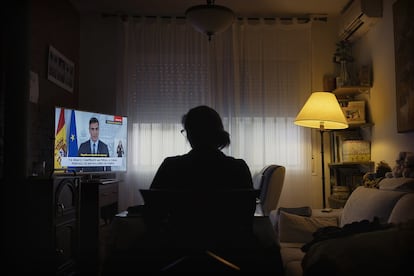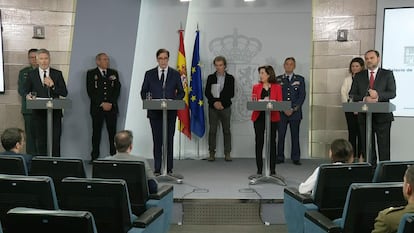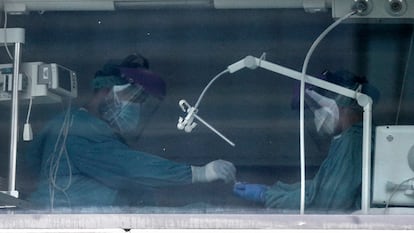‘Stop everything that has to be stopped’: The inside story of Spain’s coronavirus state of alarm
EL PAÍS chronicles the days running up to the spring lockdown and what came after in an era that some ministers describe as the worst of their lives

Just two years earlier, none of the three main protagonists taking the most difficult decision of a generation could have imagined doing so. Running fourth in the polls, Pedro Sánchez came to power through an unexpected no-confidence motion against then prime minister Mariano Rajoy of the conservative Popular Party (PP). Salvador Illa, a member of the Catalonia Socialist Party (PSC) and a philosophy graduate, never thought the Health Ministry was for him; and Fernando Simón, a high-ranking PP appointee, had kept to the wings since the Ebola crisis.
But in mid-March, 2020, there they are; all three know what is at stake and know they must take action.
The coronavirus figures are getting worse by the hour. A complete lockdown and a state of alarm has been on the cards for days – at least since the evening of March 8, when the number of positive cases shot up in Madrid and the Basque Country, prompting both regions to shut down schools. Sánchez is wavering. On Tuesday, March 10, he is still torn between the opinion of highly politicized ministers, such as Transportation Minister José Luis Ábalos and Unidas Podemos leader Pablo Iglesias, who are pressing for a state of alarm to be declared, and those in the economic sphere such as Finance Minister María Jesús Montero and Economy Minister Nadia Calviño, who want to exercise caution.
The Spanish government – led by a coalition of the Socialist Party (PSOE) and Unidas Podemos – has taken all kinds of measures to try to avoid this situation. Two Cabinet meetings have focused on coming up with alternatives – flights to Italy are stopped, the number of people allowed at events and social gatherings is cut, then cut again, teleworking is enforced and citizens are asked not to travel – anything to avoid the economic collapse that would result from declaring a state of alarm and ordering everyone to stay at home.
But the pandemic sabotages everything. Every decision taken is seen within hours to fall short of what is required. The number of deaths and the incidence rate are multiplying. Simón, who has spent days analyzing the scenarios with Illa, does not usually speak categorically. He tends to lay out both the pros and cons, leaving it to the politicians to decide. But this time he gives it to Sánchez straight. The virus is getting out of control.
–Prime minister, based on the data showing how the pandemic is evolving, with the models we are working on, and looking at countries with similar experiences, especially Italy, we have to reduce the mobility of the population as far as possible in order to bring this under control and not have a very serious healthcare crisis. There is no other choice.
There is a long silence in the room. All eyes are on Sánchez. The prime minister leans back in his chair and takes a deep breath.
–Okay, let’s do it. Let’s work out how.
This conversation took place one year ago. From this point on, the political and administrative machinery is set into motion. Sánchez multiplies the number of calls he makes and consults with the most loyal members of his team: Deputy Prime Minister Carmen Calvo, PSOE congressional spokesperson Adriana Lastra, chief of staff Iván Redondo, and ministers Montero and Ábalos. All aspects of the decision have been looked at by Thursday evening, March 12. That is the day Spain overtakes France as the second country in Europe with the highest number of coronavirus cases; it is also the day the European Centre for Disease Prevention and Control (ECDC) recommends activating measures to alleviate the pressure on healthcare systems. Several regions are already pushing for a complete lockdown. Even Portugal, with far fewer cases than Spain, has decreed “a state of calamity.” It is increasingly evident that Sánchez is lagging behind. There is no time to lose.
Sánchez calls Félix Bolaños, his right-hand man, to prepare the state of alarm decree with Calvo’s team. The decision has been made, but he wants to listen to then Health Minister Illa, who will be a key player in the coming weeks. He calls him to find out what he’s thinking. It is already Friday, March 13, one day before the decree is approved.
–Salva, how do you see the state of alarm?
–I think it is necessary. It is the most appropriate course of action.
–Why?
–Because coordinating the measures among the regions is going to take more time than we can afford, and it is essential to react quickly. There is no margin to make any deals; every hour is vital.
–Is the Health Ministry in a position to manage the entire healthcare system?
–No. The regions must continue to be responsible if we want this to work, but we have to be able to make decisions on matters of public health and freedom of movement.
Everything is done in a rush. At mid-morning Sánchez calls a videoconference with his then four deputy prime ministers – Calvo, Iglesias, Nadia Calviño and Teresa Ribera. Also present are Ábalos and Illa, who are joined by two senior health officials, Secretary General Faustino Blanco and Undersecretary Alberto Herrera. The management of the crisis depends on expert advice, but the big decisions continue to be politically charged. There is no longer any discussion. The state of alarm is given the green light and will be approved in a Cabinet meeting on March 14. At 3.30pm, Sánchez appears on television. After the stalling of previous weeks, a new narrative emerges: “We will stop this virus together,” he says in an almost bureaucratic proclamation in which emotional messages combine with war-like rhetoric.

Former Health Minister Illa recalls that after this speech, Sánchez gives him a call. “You are doing a good job,” he tells him. The then-minister replies: “Thank you for your personal concern, but it is not necessary: let’s get to work.”
Echoing a quote by Irish poet and playwright, Seamus Heaney, Illa observes: “I thought: ‘If we get through this winter we can summer anywhere. But it’s going to be a long winter.’ And it certainly was.”
One year later, many of those involved in the decision to call a state of alarm now torture themselves with the idea that they were late in doing so. But when reviewed now in public and private, the reason for the delay is understood: based on the data at the time, the decision could not have been taken earlier. “Given what we know now, of course, we should have approved the state of alarm on February 20. But the information was very poor, and besides, nobody would have accepted it at that time,” says one member of the government. “You only have to look at the newspaper archives. Nobody wanted to close the Mobile World Congress in Barcelona. And on March 10, Valencia did not want to cancel Las Falles fiestas. Andalusia said that Easter was sacred. And nobody asked about the coronavirus in the Senate the week before the state of alarm.”
But what about that last week? Could the explosion of cases have been avoided if the state of alarm had been imposed a week earlier? There is a lot of doubt on that question, particularly because one pivotal decision took longer than expected: suspending flights to and from Italy, where most of the cases were coming from. The flights were stopped on Tuesday, March 10, but by then the pandemic was already widespread. Both Ábalos and Illa considered stopping the flights earlier several times. But as a European ally, Italy resisted being cut off and pleaded its case with Germany, Spain and France in Brussels the previous Friday. In the end, Spain acted unilaterally.
The seven-hour-long Cabinet meeting that approved the state of alarm was a harbinger of the battle that is still raging between the two elements in the government: those who lobby for maximum restrictions and propping up the economy at whatever cost, and those who prefer to maintain economic activity as far as is possible and avoid excessive debt. “Broad brush Keynesianism versus broad brush orthodoxy,” observes one government advisor drily.
The conflict between the economy and health – which the government always denies – has been at the center of all the major discussions since that first day when two annexes were set to be approved: one listing prohibited activities and the other, permitted activities. In the end, the former was eliminated to prevent confusing the public. But the government itself is aware that the precarious balance supposedly sought between health and economy has been harmful to both.
Even the state of alarm was not enough to curb transmission and ministers remember the following days as the worst of their lives. In the ghostly city of Madrid, only the sounds of ambulances could be heard from their offices, a frequent reminder of the dimensions of the tragedy. Some recall with horror the day when the army entered senior residences and revealed a Dantean scenario of abandoned corpses and elderly people without medical care. Illa’s voice became choked with emotion the day he left Cabinet to stand as a candidate in the Catalan regional election and recalled the moment he had to tell the public they could not be there at the burial of their loved ones to avoid further transmission. But worst of all: none of these efforts seemed to stop the spread of the virus.
When the state of alarm was declared, Spain had 292 known Covid deaths. One week later, that figure increased fivefold; and two weeks later, it rose twentyfold, with more than 6,200 deaths recorded. The first mistake of the crisis was to underestimate it; to consider the coronavirus not so different from the flu; to think that the only thing to be feared was fear itself. The second mistake appeared when the government became aware that it had not done enough and was forced to make up for it.
On Thursday, March 26, Illa appears before Congress. It is a difficult moment for the government. The regions are beginning to complain that the central government has taken over their responsibilities. Criticism from the opposition, which had supported La Moncloa up to this point, intensifies with reports that question the government’s response to the pandemic. That same Thursday, EL PAÍS reports that the rapid coronavirus tests purchased from China by the Health Ministry are faulty. Illa sidesteps the issue, but that afternoon he receives an alarming message from his team: the data has got completely out of hand.

Illa repeats the warnings from Fernando Simón and his second in command, Pepa Sierra, and Miguel Hernán, a leading Harvard epidemiologist recruited by the government. There have already been reports from several scientists, among them virologist Antoni Trilla, in which everything is laid out in black and white for the first time, namely, the possibility that intensive care units (ICUs) could be pushed to breaking point. “With data from Facebook and a specially created mathematical model, it is clear that if mobility is not reduced by 60%, intensive care units will be overwhelmed in less than 15 days. A decision must be taken: hibernate the economy, a strict lockdown, a Middle Ages model. And it has to be taken now,” says Illa.
Illa contacts Sánchez and the prime minister calls a virtual meeting the following morning, but at the same time he asks Illa to compare the data with the figures from Telefónica – the Spanish communications giant – and validate the model used by the epidemiologists with Social Security Minister José Luis Escrivá. The results are even more alarming: “Mobility had to be reduced by around 75% or 80% to prevent ICUs from collapsing in less than 15 days,” Illa recalls. “That was the most delicate moment in the whole crisis.” Hernán’s message to Sánchez is unequivocal and leaves the prime minister with no choice. “After such a forceful intervention, there is no prime minister who could not make the decision to hibernate the economy,” says one of those present.
And the prime minister takes that decision.
–Stop everything that has to be stopped, and stop it now.
Once again, the battle between economy and health starts to rage. Every businessman with clout who has access to a minister makes that call: the captains of the Basque Country’s heavy industry crank up the pressure. Some sectors go directly to Sánchez. Employers are outraged. “A country’s production cannot be stopped. This is ruinous!” This message is issued by everyone from Antonio Garamendi, leader of the Spanish Confederation of Business Organizations (CEOE), to businessmen at the highest levels who call all their contacts. Several ministers then try to save some sectors.
Politics is the art of withstanding pressure. But this time it is different. There is an offensive being launched from all sides. The businessmen are flagging up the fact there are thousands of jobs at stake; and the loss of jobs is one of the biggest blows for a minister. The labor minister, Yolanda Díaz, is drafting a decree with Félix Bolaños that will use the formula of recoverable paid leave to paralyze the country’s economy – a kind of forced vacation at Easter after which employees will gradually return to their work stations, though all the ministries are asking for exceptions to be made. Arriving at a Cabinet meeting, the next day, Sanchez explodes.
–Enough is enough. We are all getting calls from businessmen. The same people who are calling you are also calling me. We’re going to stop everything except what is essential.
After a period of hibernation – a kind of induced coma for the economy – the curve very gradually starts to flatten. But further down the road, there will be a second wave, and a third. And the tension between the economy and health continues while a fourth wave looms. A year later, the invisible enemy has yet to be vanquished.
Major crises make the impossible possible. The coronavirus turned the world upside down: just one year ago, democracy and capitalism were suddenly put on hold. The whole of Europe passed emergency laws, lawmakers stayed at home, demonstrations were banned, elections were delayed and opposition parties, at least in civilized countries, made strange pacts of national unity with governments, driven by a mixture of fear and responsibility in the face of the deadly enemy. Spain was no exception.
Psychologists say that we only remember situations in terms of the beginning, middle and end: the problem is that in the case of the pandemic, 12 months on, there is still no end in sight. When spring 2020 was about to start, a health crisis of extraordinary dimensions flourished; now as spring 2021 has begun, that crisis is still with us.
“The first thing that the plague brought to our town was exile,” notes the narrator of Albert Camus’ The Plague. Over the past year, we have managed to get a fairly accurate idea of what he was referring to. The writer George Perec, in Life A User’s Manual, has a character who dedicates himself to burying dead words: he collects them, arranges them, declares them officially defunct and entombs them in careful lists. There is still a long, long way to go before coronavirus and Covid-19 will be subjected to the same fate.
English version by Heather Galloway.